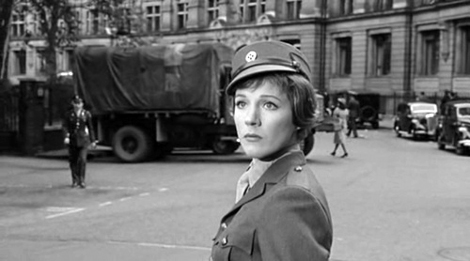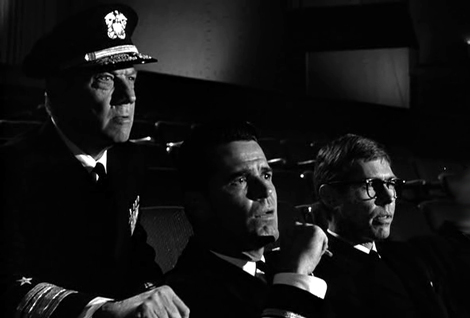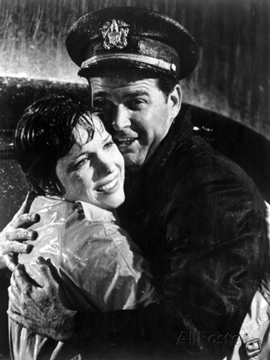|
|
Reviewed by Glenn Erickson
Much admired in the industry but not quite embraced by the general public, 1964's The Americanization of Emily is a prophetic motion picture. It's a romantic comedy but also something of a genuine black comedy, that may have been encouraged by the success of Stanley Kubrick's Doctor Strangelove: it takes on issues considered by many to be off limits for the screen. Paddy Chayefsky's dark rewrite of the novel by William Bradford Huie dares to say that our reverence for War and its heroes is a societal sickness. Chayefsky later became known for his bitter satires about dystopic institutions, Hospital and Network. In contrast to their bile and anger, his Emily screenplay is one of his most charming efforts. It has to be, for at its heart it has as subversive a message to sell as Charlie Chaplin's Monsieur Verdoux. War may be Hell, but to Chayefsky its glorification is a worse obscenity. All the medals, accolades, tombs and revered remembrances of Wars are like overdone Christmas decorations. Chayefsky argues that because wars all turn out to have been avoidable political spats, it's insanity to perpetuate the institution by honoring its dead. Not only that, but it is implied that the military is in the business of creating dead heroes and nationalist martyrs.
The war being criticized in Emily is WW2, the exceptional "good war" still generally considered both just and unavoidable. If anything, the movie's themes are more controversial today than they were in 1964. In Chayefsky's screenplay, James Garner's self-proclaimed professional coward defends America against European criticism by proudly asserting that the USA never produced a warmongering despot like Hitler or Mussolini. We never had a leader that invaded other countries and started wars as part of an aggressive national policy...

The story takes place in the higher echelons of command, where aides to generals and admirals never go near a battlefield. Lt. Commander Charles Madison (James Garner) serves as a "Dog Robber" for Admiral Jessup (Melvyn Douglas), procuring mountains of consumer goodies to throw lavish entertainments in the middle of strict war rationing. Charlie also procures party girls, much to the delight of his best buddy, Lt. Commander Bus Cummings (James Coburn). At first shocked by the arrogance and immorality of the American allies, war widow-turned military chauffeur Emily Barham (Julie Andrews) responds to the rogue in Madison and becomes his lover. Charlie has a peculiar philosophy, a personal plan to stay as far from combat as possible. He disdains heroism and honor for he believes the whole war business to be a corrupt lie that inspires generations of young men to waste their lives. Unfortunately, Admiral Jessup suffers a nervous breakdown. He orders Charlie to make a political public relations film about the first casualties on Normandy Beach. Our "yellow through and through" Commander finds himself trapped into undertaking an almost certain suicide mission.
The Americanization of Emily is a highly entertaining Service Comedy and a pleasing romance with excellent work from attractive and vivacious stars Andrews, Garner and Coburn. The chatter is bright and the level of wit high enough to sustain Chayefsky's constant stylized dialogue. When Charlie Madison gets on his soapbox his words come out like rehearsed oratory. Even when slinging insults in the rain, he uses words like "unregenerately". Chayefsky's heightened speeches are so slick that average viewers can be forgiven for not noticing when Charlie Madison begins toppling sacred cows right and left. And I don't take the word "sacred" lightly -- a quick look at the segments featured on any network news show, and it's obvious that America takes its military and veterans very seriously right now.
The logic behind some of Chayefsky's clever arguments is a little shaky. Some of it plays like double-talk, a series of thick arguments animated by Chayefsky's writing skills -- he's such a smoothie, he could sell yellow snow to Eskimos. He pokes sick fun at War in general, not just its glorification. There's considerable tension over the fact that the film is set prior to D-Day, which society generally assumes was an unquestionably justified military action. Garner dismisses the sacrifice of soldiers taking islands in the South Pacific, using the argument that "somebody could get killed" to let others do the fighting.

Emily invites us into the corruption by getting us to side with Garner's slick operator Charlie -- he's just taking care of business, after all. Then Charlie lays into the British, first calling Emily a prig because she isn't casual about sex, and then lambasting her country's snooty military tradition that sends sons off to die alongside their fathers. Emily's mother (played nicely by Joyce Grenfell) is a sitting duck for Charlie's arguments, as she's already lost a father, a son and a husband to the war. Garner's discourse against blind jingoism makes some sense, of course. But The Americanization of Emily is not an absurdist anti-military fantasy like Catch-22. Chayefsky argues that all conflict is a sham, and that's just not true. Not only are there genuine monsters like Hitler to be resisted, millions of helpless combatants on all sides didn't share Charlie Madison's luxury of choice -- they're in it whether or not they want to be.
Nor does it seem fair for Charlie to pick on the English, as plenty of American families follow similar military traditions. The English island is fighting for its very survival, so the sacrifices made by its men are not meaningless. Chayefsky skates on thin ice here. The scene where Charlie disabuses Emily's mother of her illusions is wickedly pointed, but it's also cruel, and a cheap shot. He's perfectly happy to clobber the old lady with opinions he'd never air before his superior officers. Charlie really is a coward.
Chayefsky keeps all of this going by centering on the plight of Madison and Emily, who eventually face their future in a traditional way, by declaring that love will solve all their problems. As this is a romance, it doesn't matter that they're of different nationalities or that Charlie is "the most corrupt man she's ever known." The Production Code office can't have been very happy -- Emily is one of the few motor pool drivers that doesn't sleep with American officers, and even she admits to having taken a number of soldiers to bed as a personal reaction to the war. The pliable motor pool girls are rewarded with impossible-to-find clothing & perfumes and are invited to parties where things Englanders haven't tasted in years -- like avocadoes - are to be found in abundance. The film is extremely adult for 1964 -- several shots were optically darkened to obscure nudity.
The show eventually turns its own thesis on its head. Charlie changes his attitude about combat morality and "doing the right thing", and then switches back again, all in one scene. Chayefsky has Charlie take back all those soap box speeches with the winking admission that the hypocrisy of the army and of war in general is hardly an earth-shattering revelation.
In the end, the film ducks its own message. The general audience isn't interested in Hollywood movies that tell them that Uncle John or Cousin Jimmy died for nothing. Even the liberal milestone The Best Years of Our Lives makes a villain out of a character who presents that argument.

It's easy enough to just turn one's brain off and enjoy the great acting and funny lines. Chayefsky invents several clever euphemisms to substitute for rough language and at one point even has Charlie call Emily a bitch. She doesn't want to become Americanized, i.e., seduced by Yankee consumer riches and arrogance. Charlie gets to rub her indignation back in her face, by telling her as they break up their relationship, "I want you to remember that when you last saw me, I was unregenerately eating a Hershey Bar!" Emily extends Chayefsky's florid language to all kinds of character interaction. It's not as stylized as the weird Deadline at Dawn or Sweet Smell of Success, but the stylization is definitely there. Interestingly enough, Chayefsky's Hospital, Network and Altered States share with Emily the exact same plot trick: a major character goes nuts and begins to see visions that warp reality for the other characters.
The film is a career highpoint for most of its actors. Garner is all over Charlie Madison, the apex of his winning, smart-ass Maverick persona. His Charlie Madison was once a hotel manager specializing in the procurement of females, a skill he employs to better serve his admiral. James Coburn shapes up as star material with a snappy major supporting role, and Melvyn Douglas is spot-on as the Admiral fighting not for victory but for the betterment of his branch of the service. There's also good playing both farcical and straight from Edward Binns, William Windom and Liz Fraser. Favorite Keenan Wynn performs a great drunk act with Dobie Gillis alumnus Steve Franken. Alan Sues and Judy Carne (both of Rowan & Martin's Laugh-In) are a camera specialist and "Nameless Broad" respectively; the film may be progressive in some regards, but its females are mostly bimbos. Sharon Tate is said to be visible somewhere. She was or was soon to be producer Martin Ransohoff's girlfriend.
Ransohoff's production is splendid, with excellent B&W photography and clever cinematic shortcuts to make us think we're seeing a lot more production value than we are. The only gripe about the physical production concerns the women's hairstyles: Andrews, Fraser and all of Garner's good-time motor pool girls sport poofy 1964 big-hair hairdos ... there's little or no period feeling. This and Mary Poppins are Julie Andrews' first films, and she's so good in a mature role that we immediately understand why she felt stifled by her subsequent kiddie-nanny career. Emily has no shame when she admits to sleeping around ... it's a challenging role and Andrews carries it off with dignity.
The Americanization of Emily certainly has a different take on D-Day than Saving Private Ryan, even though they share the same opinion about the odds for survival on Normandy Beach. Its precocious / suspicious thesis is brilliantly written, and the movie is highly enjoyable. "You know Marty, that Paddy Chayefsky can really write."
The Warner Archive Collection Blu-ray of The Americanization of Emily is a terrific encoding of this handsomely filmed gem. Even in Blu-ray B&W films don't always look right, but Philip Lathrop's crisp images have that original theatrical feel. The solid audio supports the (plentiful) dialogue and Johnny Mandel's music track. Mandel also did the music for the later service comedy M*A*S*H, which at times lends Emily a similar faux-patriotic, Black Comedy tone.

A featurette about filming the Normandy beach scene is present, along with an original trailer. The WAC reuses director Arthur Hiller's good commentary from the 2005 DVD. Hiller says that Andrews, Garner and Coburn all listed Emily as their best picture. His take on the movie is that the script isn't anti-war but only against its glorification, which sounds like a handy dodge should somebody claim that the film isn't patriotic. Hiller does let us know that the U.S. military disapproved the script and offered zero cooperation. It's interesting that the Pentagon gets to choose which productions receive millions of dollars of free manpower and materiel. Taxpayer money promotes movies deemed good PR for the services, while others are shut out. It sounds like the kind of military job Charlie Madison would handle, making decisions from the golf course.
On a scale of Excellent, Good, Fair, and Poor,
The Americanization of Emily Blu-ray rates:
Movie: Excellent
Video: Excellent
Sound: Excellent
Supplements: Trailer, commentary by Arthur Hiller, original promo featurette
Deaf and Hearing Impaired Friendly?
YES; Subtitles: English
Packaging: Keep case
Reviewed: March 12, 2014

Text © Copyright 2014 Glenn Erickson
See more exclusive reviews on the Savant Main Page.
Reviews on the Savant main site have additional credits information and are often updated and annotated with reader input and graphics.
T'was Ever Thus.
Return to Top of Page
|

